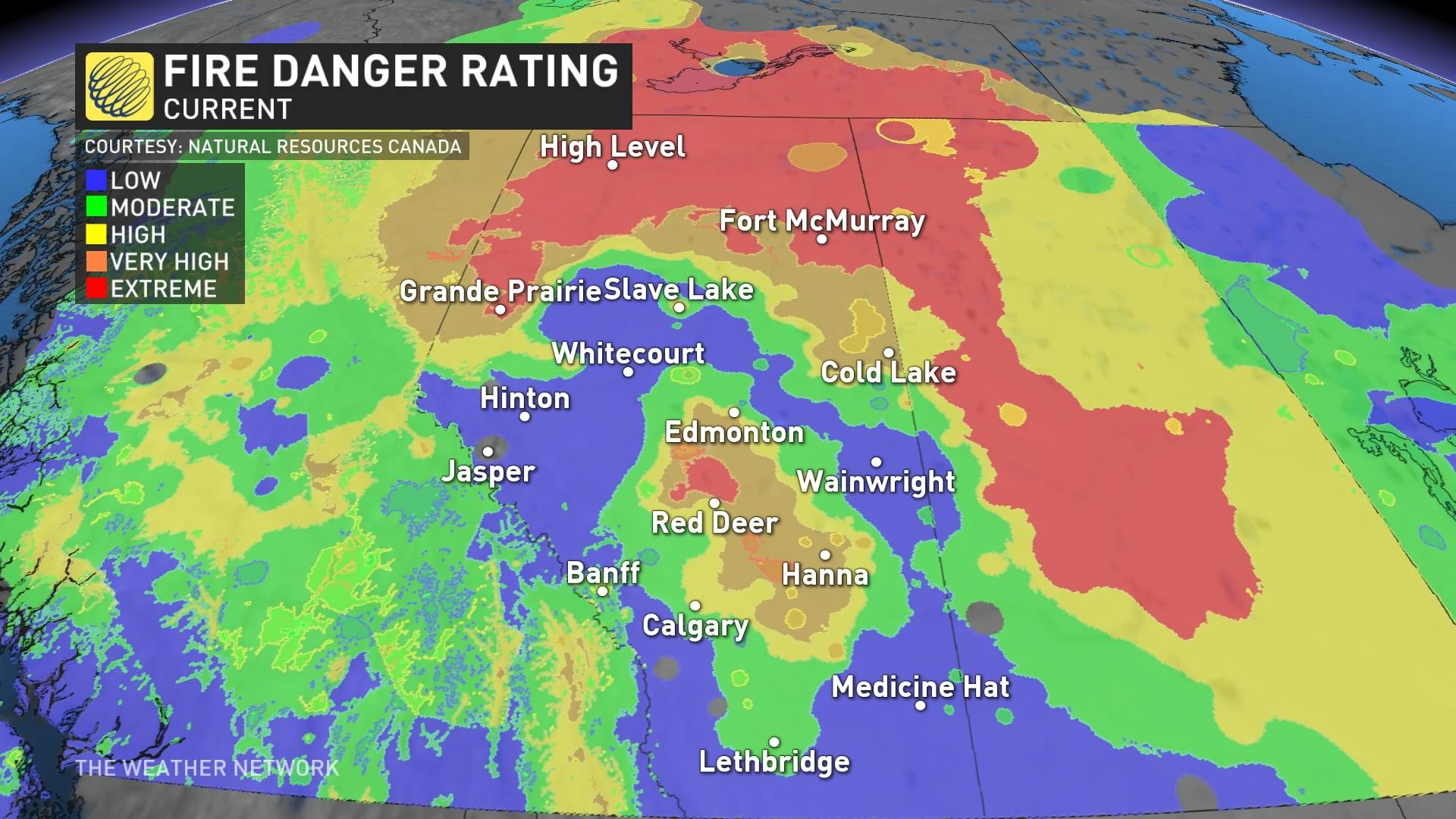
Progress made in Alberta wildfire fight but dangerous days still ahead
Alberta's fire statistics were less dire Tuesday, with fewer active and out-of-control blazes than the previous day and 5,000 fewer people among the ranks of evacuees.
But officials warn that the danger is still high and things can change in an instant.
RELATED: Wildfire smoke is on the move, millions in Canada to feel the impacts
There were 88 fires burning, including 24 classed as out-of-control, and 24,000 evacuees as of Tuesday afternoon, Colin Blair, executive director of the Alberta Emergency Management Agency, told a wildfire update.
The reprieve was thanks to rain and cooler temperatures in parts of the province, added Christie Tucker, information unit manager with Alberta Wildfire. But it's not expected to last long, she said.
"The fire danger remains high in many northern areas of the province, which means that we can still see active wildfire behaviour there," Tucker said.
"But in much of the southern and central parts of the province, firefighters have been helped by cooler temperatures and humidity today. These less active conditions mean it's safer for firefighters to access the wildfires and get heavy equipment in to help create fire breaks around communities."

Fires illuminate the sky in Harmon Valley, Alberta on May 6 (James Lawrence/supplied)
While there wasn't much new information provided on Tuesday, the province clarified that relief payments for Albertans, which were announced on Monday, will be available to individuals who had been out of their homes for seven total days, not seven consecutive days.
As well, Blair said that Monday's call for volunteers with firefighting experience drew responses from about 100 people. Officials are now working on triaging and assessing the skills of those who volunteered, he said.
A nightly telephone town hall will be held from May 9 through 14 at 7 p.m. to provide wildfire updates and answer questions from evacuees. Join online or by phone at 1-833-380-0691.
Homes destroyed
The reprieve felt in central Alberta didn't extend to the northernmost reaches of the province, which received little to no rain. Drought-like conditions, powerful winds and a forecasted return to extreme heat are expected to fuel wildfires over the coming days.
In some of these communities, residents who fled for safety are learning that their homes may not have survived the flames.
Four northern Indigenous communities — Sturgeon Lake Cree First Nation, Little Red River Cree Nation, East Prairie Métis Settlement and Fox Lake — are among the Alberta communities now reporting significant losses.

Edson, Alta., wildfire (Brett/Submitted)
At least 40 structures were destroyed on the Sturgeon Lake First Nation, located 360 kilometres northwest of Edmonton, its chief said in a video posted to social media.
"We're still evaluating the damage," said Chief Sheldon Sunshine, of the Sturgeon Lake Cree First Nation. "As the fire is still ongoing, there is more and more damage that continues to occur."
Around 1,600 people were forced to flee from the community on Friday. It could be up to a month before they are allowed to return home.
As of Tuesday afternoon, 89 wildfires were burning across Alberta, 25 of which were burning out of control. Around 24,000 people remain displaced from their homes across the province.
'Substantial damage'
Sunshine said no access is being granted to the Sturgeon Lake Cree First Nation community and the band council will be bringing in security to secure the evacuation zone.
The immediate damage to infrastructure is already extensive, he said.
"We want to keep people safe," he said. "There is substantial damage to the power grid. There are power poles in multiple areas that are down. Our water treatment plant went down due to loss of power.
"This is going to take several weeks to sort out.… We're asking our residents to be patient with us as we work on our recovery plan."
The East Prairie Metis Settlement, located about 125 kilometres to the east, lost 14 homes. A bridge in the community was also destroyed, meaning some members may not easily get home even if the evacuation order is lifted.

Brad Desjarlais, a firefighter in the community, said it has been extremely dry in the area, especially the grass.
"It was fast, like really fast," he said about the fire. "It was fast and zig-zaggy."
The reports of damage to homes is even more severe in communities in the far north of the province.
In the Little Red River Cree Nation, homes made up most of the 40-plus structures lost to fire.
About 3,700 residents scrambled to get out of the area after the evacuation order was put in place last week, said Darryel Sowan, the community's emergency management communications co-ordinator.

There is no road into the community, so most people used boats to flee, while others were flown out.
"Because it's isolated, a lot of those people have never even been away from the reserve," Sowan said.
"We want to get them back there and they want to go home. We are trying our best.
In nearby Fox Lake, the province said a 4,400-hectare wildfire destroyed 20 homes, an RCMP detachment, the community's only grocery store store and the water treatment plant.
Both communities are located about 550 kilometres north of Edmonton.
Alberta's wildfire season had an intense start, with mandatory evacuation orders issued over the past week to more than a dozen communities across the province.
The flames have closed city roads and breached highways, triggered air quality alerts, and caused power multiple power outages. Fortis Alberta said around 400 power poles have been damaged or destroyed by fire and crews are working overtime to restore power to communities still in the dark.
The province, which remains in a state of emergency, has asked the federal government for help and requested military assistance to help maintain order and prevent looting in evacuation zones. Meanwhile, firefighting aid has been coming from across the country.
'Waiting to wake up'
While cooler weather has offered a respite, anxiety is still running high over what the sleeping giant will do next.
"I've never seen a fire this big," said Brian Davidson, fire chief of in the town of Fox Creek, about 250 kilometres northeast of Edmonton.
"Right now, it's 52 kilometres from tail to end."
Crews were working Tuesday to protect the community from a wildfire burning east of the town, he said.

Residents were to evacuate on Friday. The fire is still classed as out of control, now covering more than 21,000 hectares.
Davidson, who has live in Fox Creek for 43 years, said firefighters are attempting to take advantage of slightly cooler temperatures and relatively calmer winds before the scorching heat returns this weekend.
"We have a two day window to set up defences," he said."It's basically just sitting there, waiting to wake up depending on weather conditions."
Davidson said the desire to return home may be strong for evacuees but the town remains dangerous.
He urged residents to respect evacuation orders.
"I can't sleep well at night knowing that what's lurking out there could turn on us."
Hopeful for reinforcements
Four homes were lost just outside the northwestern city of Grande Prairie after the Dunes West wildfire, at 1,500 hectares, crept up the bank of the Wapiti River and entered residential areas within the evacuation zone.
Trevor Grant, regional fire chief in Grande Prairie, said his crews have struggled to manage the rapidly spreading fires with limited resources.

At one point, firefighters had to be pulled back as the flames breached the established perimeter, he said.
As of Tuesday, crews were working to extinguish hot spots along the fire's perimeter and attempting to contain its spread along the banks river, which runs through the city.
Grant said the county is now welcoming reinforcements from other Alberta fire departments.
"Most of them are arriving now," he said. We'll be able to get some reprieve for our crews who have been working constantly since the fire started."
WATCH: Why wildfires are growing at a rapid rate this spring in Alberta
Davidson, who has live in Fox Creek for 43 years, said firefighters are attempting to take advantage of slightly cooler temperatures and relatively calmer winds before the scorching heat returns this weekend.
"We have a two day window to set up defences," he said."It's basically just sitting there, waiting to wake up depending on weather conditions."
Davidson said the desire to return home may be strong for evacuees but the town remains dangerous.
He urged residents to respect evacuation orders.
"I can't sleep well at night knowing that what's lurking out there could turn on us."
Alberta's wildfire season had an intense start, with mandatory evacuation orders issued over the past week to more than a dozen communities across the province.
The flames have closed city roads and breached highways, triggered air quality alerts, and caused power multiple power outages.
Fortis Alberta said around 400 power poles have been damaged or destroyed by fire and crews are working overtime to restore power to communities still in the dark.
The province, which remains in a state of emergency, has asked the federal government for help and requested military assistance to help maintain order and prevent looting in evacuation zones. Meanwhile, firefighting aid has been coming from across the country.
Officials from Alberta Emergency Management Agency and Alberta Wildfire are expected to provide an update on the wildfire situation Tuesday at 3 p.m. MT. You can watch the news conference here.
WATCH: Family 'shell-shocked' after losing home to wildfires
Thumbnail courtesy of Alberta Wildfire/Twitter via CBC.
The story, written by Wallis Snowdon, was originally published for CBC News.









